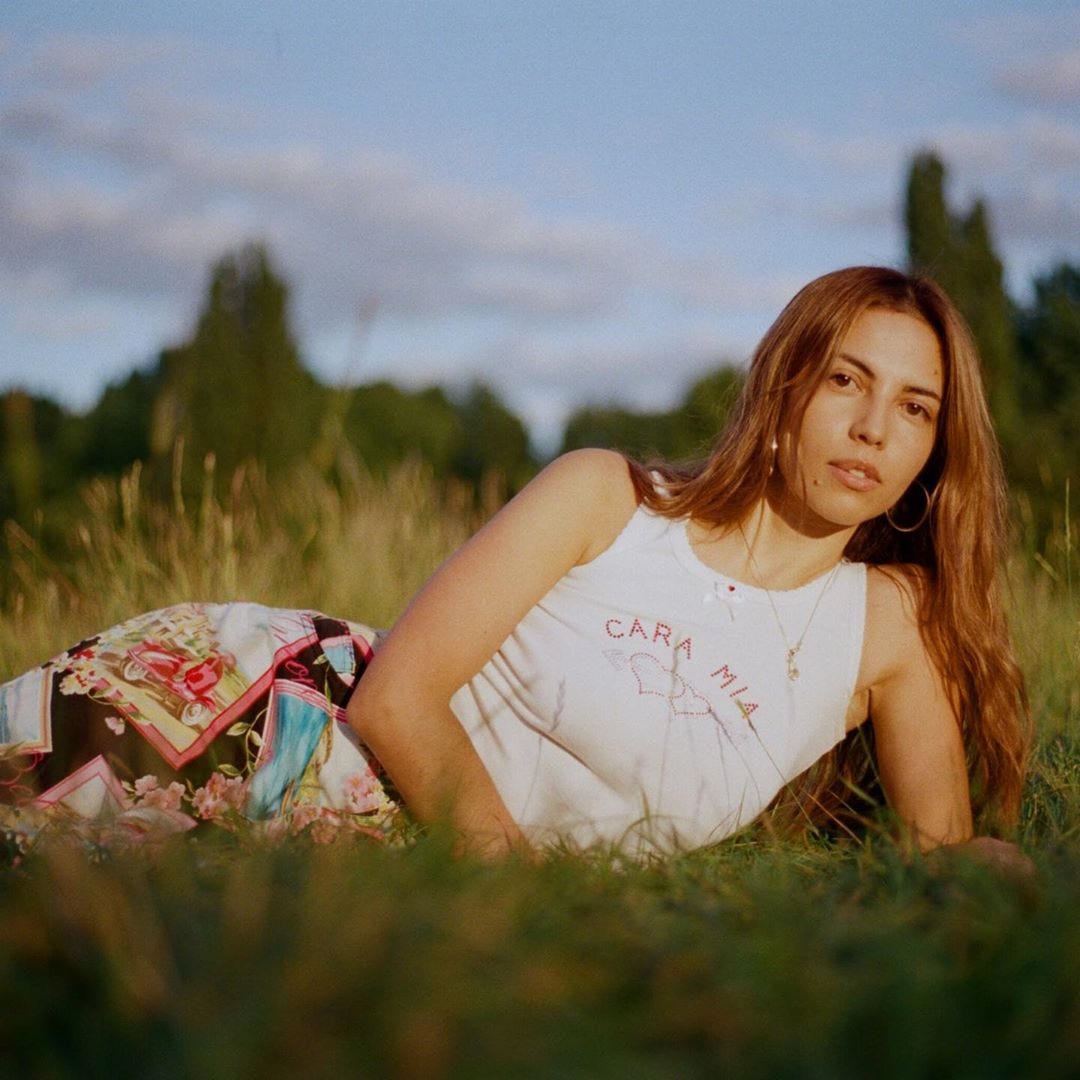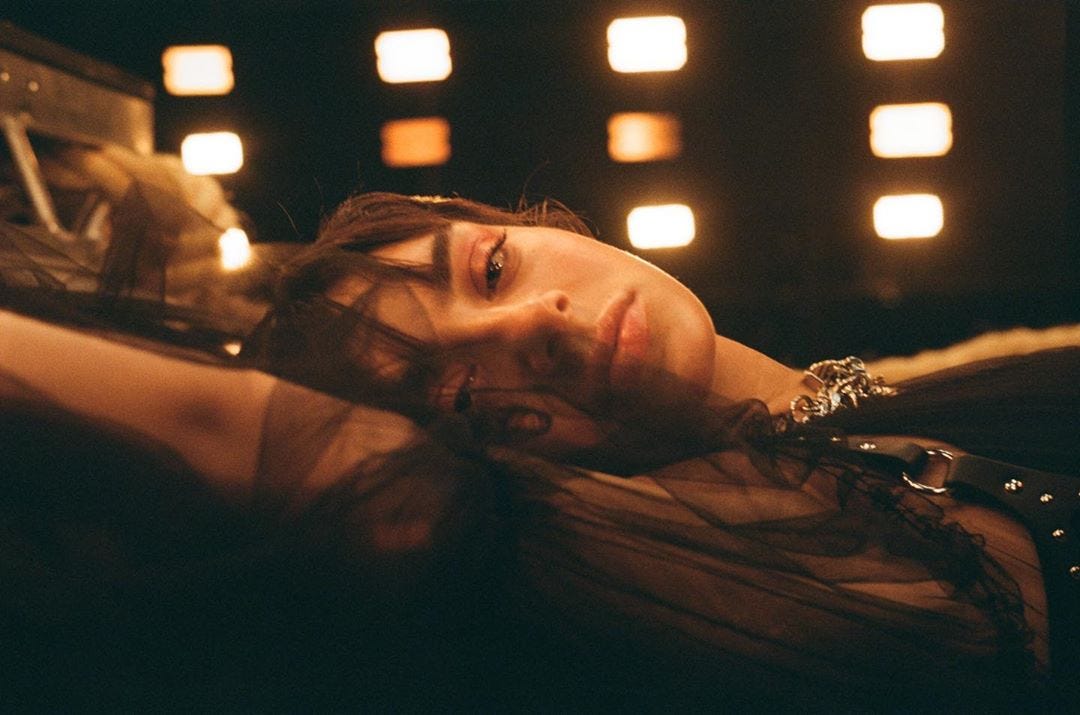Notes on ... Music, with Angela Stephenson
A two-part interview series exploring creativity in music.
This special edition of Delicious Creativity is part of ‘Please Stand By’ — a music concept by Edsa, inviting members of the cultural and creative industries to share stories, playlists, and recipes reflecting on slowing down in the public space.
The first of a two-part interview series, Sai Villafuerte sits down with Angela Stephenson — a London-based filmmaker, photographer, and, most recently, DJ under the alias Angelita. She worked as a broadcast producer and director for Boiler Room for five years before going freelance in 2018. Her work overlaps between music and fashion, working closely with artists including Charli XCX, Eden, Eyedress, and more.
On Sunday, 23 August, we will publish our second interview with David Ong, Manila’s cocktail maestro in the Philippines. David is the honcho of OTO, one of Asia’s 50 Best Bars in 2019, The Curator, and EDSA Beverage Design Group.

A portrait of Angela Stephenson, shot by @bare_clips.
I first spoke to Angela in December 2018 when I wrote a feature for Huck on her documentary, To Live and Die in Manila. The short film, produced by Boiler Room, traces the stories of musicians living through the Philippines’ war on drugs. Being half Filipina, what started as a desire for Angela to acquaint with the scene of her motherland became a deep dive into something bigger than herself — namely, the undying spirit of music amidst calamity and chaos. To quote Jorge Wieneke, one of the musicians featured in the film and who I interviewed for Huck, “pressure makes diamonds.”
Fast forward nearly two years, this simple truth still reverberates strongly as artists grapple with their creativity in this brave new world. Like me, Angela took her first stab at DJing during quarantine to relieve nightlife withdrawals. In this interview, we discuss the joys of discovering a new hobby, her long-standing relationship with London's dance music scene, and the parallels between being behind the camera versus behind the decks. Angela also contributed a guest mix showcasing her work-in-progress sound — from fast-breaking garage and drill to French hip-hop.
We at Edsa hope this conversation provides reassurance to anyone making sense of their creativity right now. Angela's work is fundamentally defined by her infectious love for music; this clearly bleeds between her words, reminding us to brave through the traffic of ideas wherever it takes us.
Because until we arrive, it is the little moments in between that will make the journey all the more remarkable.
— Sai
Sai V: I really love the mix you sent in. You play garage that’s quite drone-y. I’ve never heard music like that. I was so impressed.
Angela S: Thanks! I just put it together last night at around midnight while there were thunderstorms outside. We just had a heatwave here.
SV: Would you say this mix represents your sound?
AS: I have this joke with my friend that my vibe is "sexy aggressive.” I think I have a lot of pent-up aggression. [Laughs] I guess that's the kind of stuff I like hearing when I'm out.
SV: I totally get that. I find myself veering more towards acid techno which is quite squelchy and hard-hitting — simply the worst nightmare for some people. It’s been quite interesting to hear what music my friends lean towards, too. You meet someone at face value. But when you hear the type of music they play, it adds another layer to their personality. It amazes me. Is that something you’ve experienced since you started DJing?
AS: For sure. I have a lot of friends who DJ, too. When I started doing it, some of them were like, “I didn't expect you to play this type of music.” I don't know if I did either. I've surprised a few people, which I kind of like.
SV: So, how did you get into DJing? Obviously, during quarantine. But what is the story behind that?
AS: Most of my friends are DJs and I worked in nightlife for over five years. Everyone else did it but I always thought, “Oh, that’s their thing. I do video. There’s no point.” But like everyone recently, I suddenly had free time. I don't think I would have started DJing if I didn't have cravings for hearing loud dance music. I was having nightlife withdrawals, that was really it. I share a studio in Hackney with Bone Soda, a music label my friends run. We all used to work at Boiler Room together. They have decks in the studio where we can get away with playing loud music during all hours of the night. It was really a blessing. I thought, “You know what, I can do this all the time!”
SV: That's so cool. I know your relationship with the music scene was established through your work as a filmmaker and photographer. Could you explain how that developed?
AS: For me, filmmaking and photography always went hand-in-hand with music. I started doing gig photography around ten years ago, when I was eighteen, mainly shooting on analogue film. At the time, I didn't have many friends who listened to the same music I did, and photography gave me an excuse to go to festivals and shows alone.
Then, I started working for Boiler Room’s broadcast production team in 2013. Suddenly, I had a crew. We had varied music tastes, but we all had the same interests and just loved nightlife. I probably produced over 250 live broadcasts for Boiler Room, surrounded by musicians and DJs in different club venues all over the world. I was documenting a lot of it for my personal collection, then I started sharing portraits online. That eventually led me to make documentaries. I’ve been freelancing for two years now and I still very much work for music. I think people trust me because music always took precedence. It's always been that relationship.

A portrait of Charli XCX, shot by Angela Stephenson.
SV: How would you differentiate your process then, being behind the camera versus the decks?
AS: They are different in a sense that, behind the camera, I consider myself behind the scenes. I try to facilitate a calming environment for whoever I’m photographing or filming, so they are comfortable being themselves. But when I'm DJing, there's a different energy. Over the past two days, I’ve been in the studio DJing for fifteen hours. I'm just addicted to it at the moment.
I guess they’re similarly quite intuitive. With my camera, I trust wherever my eye drifts towards. It’s the same with DJing. I didn't know I had an ear for it until I started. I do plan my sets too, though. I make a playlist on Rekordbox and practice mixing it all together. With this one I sent you, I totally winged it which I wouldn't normally do. But that was fun — to not plan it and just take it somewhere.
SV: My first mix was so meticulously planned because I was getting to grips with how it all worked. With every transition, I was like, “OK, I'm specifically going to transition here and it needs to be perfect!” There was so much back-and-forth between recordings. It was a good mix, but it wasn’t spontaneous at all. I just don’t think that is the reality of how DJs work.
AS: But I think, while we can't go outside and dance, it's nice to curate that exact vibe you want. For me, it’s about developing a style. I’m thinking about it, and it's giving me a lot of practice for when I actually host a night.
SV: So, how has quarantine changed the way you listen to music?
AS: I’ve been forced to go back into teenager mode, being stuck in my room and having more time to curate my space with music. For a while, I was put off from discovering new things because of my job. I'm surrounded by music all the time. Sometimes, I just want to go back home and not listen to anything. Now, I’m gaining back that excitement from discovery. When people I love release new music, I get excited and can't wait to play it. I didn’t have that before — for a while, anyway.
SV: I think one of the most insightful things I learned since I started DJing was that exploration, which constantly needs to be kept fresh. Discovering new music is like a never-ending rabbit hole but in a beautiful way. What was the most insightful thing you learned since you started DJing?
AS: I miss the club a lot. People think clubbing is all about going out and drinking. Clubbing was never about that for me. I mean, it obviously is — I indulge too — but it's always been about music. DJing just cemented the fact that I really love dance music.
I also learned that, once you have the basics down, DJing is not that hard to do! I was so intimidated by it for so long. I encourage anyone who wants to do it or has been sitting on the idea, to just do it. Anyone could if they just gave it the time.
EVERYTHING IN BETWEEN
These tracks have been on rotation for us at Edsa HQ: ‘Rendezvous’ by Baltra and ‘For the Floor’ by Saint Guel.
Yogetsu Akasaka, a Japanese Zen Buddhist monk, performs a hypnotic vocal loop remix that will send you into nirvana.
This episode of The Hour by Resident Advisor invites five DJs to look back at their first public performance, including CC Disco, DJ Seinfeld, DJ Bus Replacement Service, Freddy K, SPFDJ and Sunil Sharpe. This podcast is also available on Soundcloud.
This inspiring TED talk by Claudio, a music producer, breaks down how to translate emotions into sound.


Source: @cat_virus.exe
Delicious Creativity is a newsletter exploring the intersections of food and creativity. You can support us by subscribing, following us on Instagram, sharing this post, or writing to us your thoughts on how we can do better.

